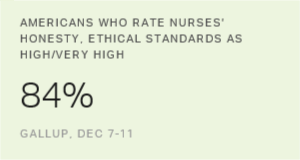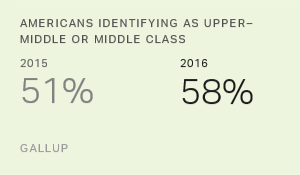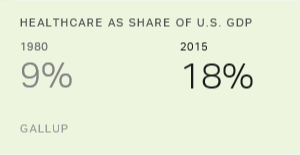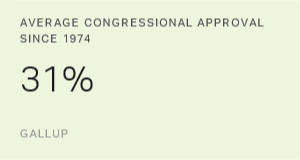Story Highlights
- Nurses rated highest among professions for 15th straight year
- College teachers' ratings dropped
- 41% say journalists' standards are "low" or "very low"
WASHINGTON, D.C. -- Most Americans trust their healthcare providers to be honest and ethical, but few other professions fare so well in Gallup's annual look at honesty and ethical standards among various fields. Nurses top the list with 84% of the public rating their standards as "high" or "very high," while members of Congress fall to the bottom -- the only profession for which a majority of Americans (59%) rate honesty and ethical standards as "low" or "very low."
| Very high/High | Very low/Low | Average | |||||||||||||||||||||||||||||||||||||||||||||||||||||||||||||||||||||||||||||||||||||||||||||||||
|---|---|---|---|---|---|---|---|---|---|---|---|---|---|---|---|---|---|---|---|---|---|---|---|---|---|---|---|---|---|---|---|---|---|---|---|---|---|---|---|---|---|---|---|---|---|---|---|---|---|---|---|---|---|---|---|---|---|---|---|---|---|---|---|---|---|---|---|---|---|---|---|---|---|---|---|---|---|---|---|---|---|---|---|---|---|---|---|---|---|---|---|---|---|---|---|---|---|---|---|
| % | % | % | |||||||||||||||||||||||||||||||||||||||||||||||||||||||||||||||||||||||||||||||||||||||||||||||||
| Nurses | 84 | 3 | 13 | ||||||||||||||||||||||||||||||||||||||||||||||||||||||||||||||||||||||||||||||||||||||||||||||||
| Pharmacists | 67 | 8 | 26 | ||||||||||||||||||||||||||||||||||||||||||||||||||||||||||||||||||||||||||||||||||||||||||||||||
| Medical doctors | 65 | 7 | 29 | ||||||||||||||||||||||||||||||||||||||||||||||||||||||||||||||||||||||||||||||||||||||||||||||||
| Engineers | 65 | 5 | 29 | ||||||||||||||||||||||||||||||||||||||||||||||||||||||||||||||||||||||||||||||||||||||||||||||||
| Dentists | 59 | 7 | 34 | ||||||||||||||||||||||||||||||||||||||||||||||||||||||||||||||||||||||||||||||||||||||||||||||||
| Police officers | 58 | 13 | 29 | ||||||||||||||||||||||||||||||||||||||||||||||||||||||||||||||||||||||||||||||||||||||||||||||||
| College teachers | 47 | 18 | 32 | ||||||||||||||||||||||||||||||||||||||||||||||||||||||||||||||||||||||||||||||||||||||||||||||||
| Clergy | 44 | 13 | 39 | ||||||||||||||||||||||||||||||||||||||||||||||||||||||||||||||||||||||||||||||||||||||||||||||||
| Chiropractors | 38 | 13 | 45 | ||||||||||||||||||||||||||||||||||||||||||||||||||||||||||||||||||||||||||||||||||||||||||||||||
| Psychiatrists | 38 | 12 | 45 | ||||||||||||||||||||||||||||||||||||||||||||||||||||||||||||||||||||||||||||||||||||||||||||||||
| Bankers | 24 | 30 | 46 | ||||||||||||||||||||||||||||||||||||||||||||||||||||||||||||||||||||||||||||||||||||||||||||||||
| Journalists | 23 | 41 | 34 | ||||||||||||||||||||||||||||||||||||||||||||||||||||||||||||||||||||||||||||||||||||||||||||||||
| Lawyers | 18 | 37 | 45 | ||||||||||||||||||||||||||||||||||||||||||||||||||||||||||||||||||||||||||||||||||||||||||||||||
| State governors | 18 | 35 | 45 | ||||||||||||||||||||||||||||||||||||||||||||||||||||||||||||||||||||||||||||||||||||||||||||||||
| Business executives | 17 | 32 | 50 | ||||||||||||||||||||||||||||||||||||||||||||||||||||||||||||||||||||||||||||||||||||||||||||||||
| HMO managers | 12 | 31 | 48 | ||||||||||||||||||||||||||||||||||||||||||||||||||||||||||||||||||||||||||||||||||||||||||||||||
| Senators | 12 | 50 | 37 | ||||||||||||||||||||||||||||||||||||||||||||||||||||||||||||||||||||||||||||||||||||||||||||||||
| Stockbrokers | 12 | 39 | 46 | ||||||||||||||||||||||||||||||||||||||||||||||||||||||||||||||||||||||||||||||||||||||||||||||||
| Advertising practitioners | 11 | 40 | 46 | ||||||||||||||||||||||||||||||||||||||||||||||||||||||||||||||||||||||||||||||||||||||||||||||||
| Insurance salespeople | 11 | 38 | 51 | ||||||||||||||||||||||||||||||||||||||||||||||||||||||||||||||||||||||||||||||||||||||||||||||||
| Car salespeople | 9 | 46 | 45 | ||||||||||||||||||||||||||||||||||||||||||||||||||||||||||||||||||||||||||||||||||||||||||||||||
| Members of Congress | 8 | 59 | 31 | ||||||||||||||||||||||||||||||||||||||||||||||||||||||||||||||||||||||||||||||||||||||||||||||||
| Gallup, Dec 7-11, 2016 | |||||||||||||||||||||||||||||||||||||||||||||||||||||||||||||||||||||||||||||||||||||||||||||||||||
Nurses have topped the list every year but one since Gallup first asked about them in 1999. In 2001, Gallup included firefighters in the list based on their heroic efforts in the wake of the 9/11 terrorist attacks, and 90% of the public rated their honesty and ethical standards as "high" or "very high."
A majority of Americans viewed only six of the 22 professions Gallup measured in its Dec. 7-11 poll as having "high" or "very high" ethical standards. For 10 of those professions, fewer than one in five Americans rated the standards as "high" or "very high" -- including key aspects of American society such as lawyers, lawmakers and business executives.
College Teachers' Rating Falls Below 50%
College teachers' honesty and ethical standards rating dropped to 47% this year from 53% in 2012. The first four ratings for college teachers, conducted between 1976 and 1983, were below 50%, bottoming out at 42% in 1977. The rating rose to 53% in 1985 and stayed above 50% in all but one of the next 18 polls through 2012.
The percentage of Americans saying college teachers' standards were either "low" or "very low" reached a new high of 18%, surpassing the 11% recorded in 2009.
Ratings of college teachers showed strong partisan differences, with 33% of Republicans giving them a "high" or "very high" rating, compared with 63% of Democrats.
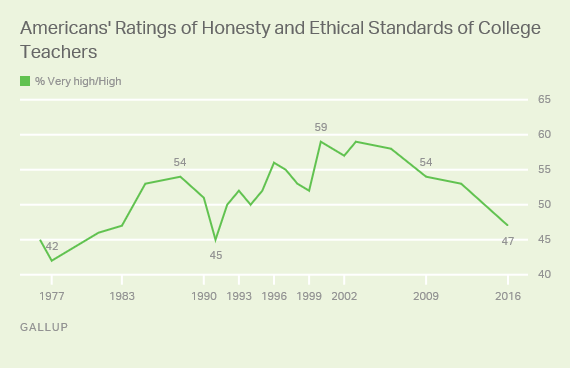
More Americans Rate Journalists' Standards as "Low" or "Very Low"
The 23% who rated journalists' honesty and ethical standards as "high" or "very high" this month is within a few points of the 20% who rated it "high" or "very high" in 1994. The percentage saying their honesty and ethical standards were "low" or "very low" climbed to 41%, 10 percentage points above the previous high of 31% measured in 2008 and 2009. In previous polls, more Americans rated journalists' standards as "average."
Twenty-one percent of Democrats rated journalists' honesty and ethical standards as "low" or "very low," compared with 63% of Republicans.
Ratings of Clergy's Honesty and Ethical Standards Continue Slow Descent
Americans' "high" or "very high" ratings of the clergy slipped to 44%, its lowest point since Gallup first asked the question in 1977. The clergy rating first dropped below 50% in 2013 to 47% and slipped one point to a new low in each of the past three years.
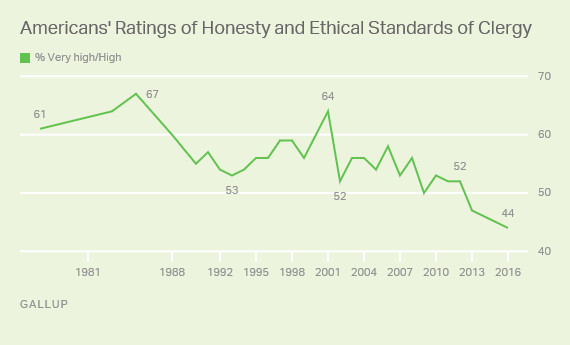
Clergy ranked at the top of the list in 1977 with a 61% rating when Gallup first included the profession in the list. In 2001, almost two-thirds of Americans rated the honesty and ethical standards of the clergy as "high" or "very high." But the sexual abuse scandal that engulfed the Roman Catholic Church in 2002 brought the rating down to 52% that year. By 2013, after a series of further revelations of abuse, less than half of the public gave the clergy a "high" or "very high" rating.
Among those most likely to give the clergy a "high" or "very high" rating this month were Protestants (59%), those aged 65 and older (58%), those who attend religious services at least weekly (57%), and Republicans (56%).
The groups least likely to rate the clergy's standards as "high" or "very high" were the nonreligious (22%), 18- to 29-year-olds (30%), those with annual household incomes under $30,000 (31%), those with a high school education or less (37%), and liberals (37%).
Bottom Line
Healthy majorities of the American public continue to show a willingness to trust the honesty and ethical standards of healthcare providers -- nurses, doctors, pharmacists and dentists. However, Americans do not, by and large, rate the honesty and ethical standards of American professions highly.
Further, for the fourth year in a row -- in a nation where religion is an important part of life for three-fourths of the population -- less than half of Americans think religious leaders have high ethical standards. Meanwhile, two groups of professionals linked to the bitter political battles of 2016 -- college teachers and journalists -- are at or near their all-time lows, with views split along partisan lines.
As Americans consider how much to trust the honesty and ethical standards of many of the country's major professions in the next few years, politics may be a major factor. With the public expecting President-elect Donald Trump to make major changes to the federal government, the fierce political battles to come could produce a litany of charges of dishonesty and corruption. Trump is already embroiled in controversy concerning what should happen to his business holdings, and that may turn out to be a precursor to the ethics charges and countercharges that lie ahead.
Survey Methods
Results for this Gallup poll are based on telephone interviews conducted Dec. 7-11, 2016, with a random sample of 1,028 adults, aged 18 and older, living in all 50 U.S. states and the District of Columbia. For results based on the total sample of national adults, the margin of sampling error is ±4 percentage points at the 95% confidence level. All reported margins of sampling error include computed design effects for weighting.
Each sample of national adults includes a minimum quota of 60% cellphone respondents and 40% landline respondents, with additional minimum quotas by time zone within region. Landline and cellular telephone numbers are selected using random-digit-dial methods.
View survey methodology, complete question responses and trends.
Learn more about how the Gallup Poll Social Series works.
